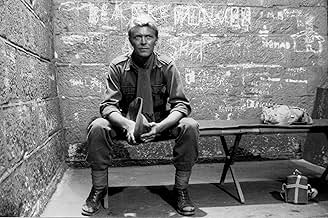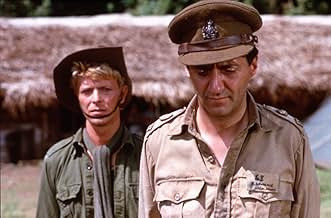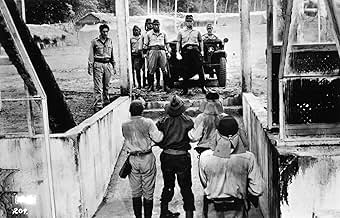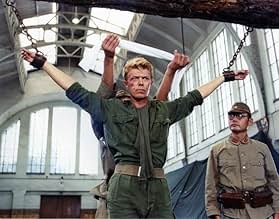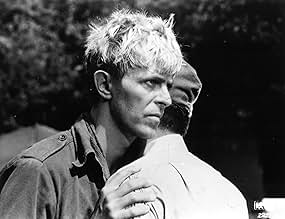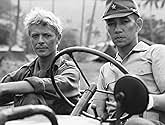Während des Zweiten Weltkriegs versucht ein britischer Oberst, die kulturellen Unterschiede zwischen einem britischen Kriegsgefangenen und dem japanischen Lagerkommandanten zu überwinden, um... Alles lesenWährend des Zweiten Weltkriegs versucht ein britischer Oberst, die kulturellen Unterschiede zwischen einem britischen Kriegsgefangenen und dem japanischen Lagerkommandanten zu überwinden, um Blutvergießen zu vermeiden.Während des Zweiten Weltkriegs versucht ein britischer Oberst, die kulturellen Unterschiede zwischen einem britischen Kriegsgefangenen und dem japanischen Lagerkommandanten zu überwinden, um Blutvergießen zu vermeiden.
- Regie
- Drehbuch
- Hauptbesetzung
- 1 BAFTA Award gewonnen
- 10 Gewinne & 8 Nominierungen insgesamt
- Hara
- (as Takeshi)
- Kanemoto
- (as Johnny Ohkura)
- Commandant of Military Prison
- (as Yuya Uchida)
- President of the Court
- (as Ryunosuke Kaneda)
- Lieutenant Iwata
- (as Takashi Naito)
- Interpreter
- (as Rokko Toura)
- PFC Yajima
- (as Yuji Honma)
Empfohlene Bewertungen
To fully appreciate MCMR, try to understand the culture of both the captors and the prisoners at the time. To the prisoners, their existence in the camp is an unfortunate result of war, and should be temporary and not a life or death experience. To the Japanese captors, the prisoners who surrendered rather than died fighting are cowards, beneath the notice of the captors and likely not even viewed as human beings. They are expendable. But first, in this particular camp, there is an effort to "educate" the prisoners about the way a *true* warrior lives life (and dies). That is where the true conflict begins.
There are multiple physical and psychological struggles going on in MCMR. There is even some homoeroticism, though it isn't fully explained. There is certainly a lot of sadness, for characters on both sides. This point is brought home at the end, when the roles are reversed for two of the characters.
Even today, I can hum several parts of the score to MCMR, and they make me melancholy as I recall scenes from the movie. If you like movies that delve into the darker side of the human spirit (with some lightness thrown in), check out MCML. I rated it an 8.
These are four compelling characters. Tom Conti is solid. Ryuichi Sakamoto is interesting. Takeshi Kitano is absolutely brilliant. David Bowie delivers a mercurial performance. I want the plot to be bigger and more intense. It's also a bit long and meanders in the second half. I do love the final scenes with Hara and Lawrence.
The acting in the movie is adequate without ever being great (the notable exception being Tom Conti who is fantastic in his role as the misunderstood titular character).
However, the movie moves beyond the acting and once you are embroiled in the atmosphere and realism you become oblivious to any acting shortcomings.
The movie must be one of the most accurate depictions of human nature in a war. It has a diverse range of characters yet none of them becomes a caricature. It certainly doesn't sink into the good vs evil mindset that many war movies do.
The violence is graphic and shocking despite lacking the visceral realism of Spielberg's later war movies.
The ending of the movie still affects me, even after repeated viewings. I still have to a lump or two to stop from crying even now.
Overall, recommended for anyone with an interest in a non-stereotypical movie about war. Not for the faint of heart though.
The story sets in Indonesia in the second world war, and tells the tale of a couple of British soldiers out in a Japanese camp for prisoners of war.
It gives us insight between the raging camp of the British soldiers with their Japanses guards. It tells the tale of prisoner Mayor Jack Celliers, a rebellious and confronting individual. It tells the tale of Prisoner Kolonel John Lawrence, who tries to build bridges between the two cultures who collide ever so often. It tells the tale of prison camp leader Captain Yonoi, who makes an effort in running things smoothly with understanding for his prisoners, but who, by the arrival of Mayor Jack Celliers, is being pressured, and discovers a whole new side of emotional understanding. It tells the tale of ward Seargant Hara, who doesn't seem to want to understand the prisoners, and would rather execute them than have them here.
Those 4 main characters come to interact with each other in very interesting ways, and the whole story rises to a dramatic climax which leaves it's impact.
The first degree acting makes this one of the most important things to watch this movie. Both British music legend David Bowie (As Jack Celliers) as well as Japanese music sensation Ryuichi Sakamoto (as Captain Yonoi) both have the lead in this epic picture. For Bowie it isn't this first time he appears on the big screen (The man who fell to earth, The Hunger),but it can be said that this is the role for which he will be remembered. Debuting here, Ryuichi Sakamoto plays the arrogant, and piped down captain Yonoi, and he doesn't make a bad figure with this. Truth is both musicians play very good, but the best parts are for debuting (at the time) comedian Takeshi Kitano (Srgt. Hara Ginko, and stage actor Tom Conti (John Lawrence) who steal the show. Conti's uptight and friendly character gives a lot of sympathetic gestures from the audience, and Takeshi has both the laughs and cry's (Watch the final scene) at his hand, for playing such a funny bastard.
Nagisa Oshima's direction is strong, and he leaves room for artistic influence for both cast and crew. He knows what he wants too show, and doesn't make the mistake of being to dramatic, or being to soft, on crimes that his fellow country committed in 1945. He stays realistic which works as a pro for this film.
The cinematography is beautiful, as well as the set and surroundings, but mostly, it is the score, the music, written by Sakamoto which leaves the most impression. A big plus, on all fronts and a absolute classic in it's genre. A must have and must see.
The story is completely about perspectives and motives: power-madness and despair. Some might find MCML hard to stomach while watching, some afterwards. But I say you have to watch it through to appreciate the concepts fully. Moreover, I say you shouldn't vote it before you've seen all of it; that way the rating wouldn't be as low as 6.9. MCML is one of those films that surpass movies like 'Platoon' (Stone, 1986) on any level. Added to all that, it's also beautifully shot by cinematographer Toichiro Naroshima (Double Suicide).
One of the best scores in history of cinema by Ryuichi Sakamoto (also 'Wild Palms' and 'Sheltering Sky'), who not only provides it with his strokes of musical genius, but also plays an important role: the androgynous and curious captain in contrast to the virility of Takeshi Kitano (dir and acted Violent Cop, Brother, Hana Bi) the self-confident and straight-forward sergeant. If you've seen any of Kitano's movies, his character in MCML will gain from that. I guess director Nagisa Oshima (Naked Youth, Gohatto) likes to play with feminine and masculine characters. David Bowie fits in brilliantly from that perspective. His character is the most complex and worked out the deepest. My opinion is that this is his best and most intriguing role so far ('the Man who fell to earth' came close). Conti ('If we'll do it, he'll do it') plays a key figure between the Japanese and the POW.
On which side to lose a war? When to intimidate and when to be intimidated?
Which side are you on anyway? 'There are times victory is very hard to take' - Colonel John Lawrence. Not without reason sergeant Gengo Hara says 'Merry Christmas Mr. Lawrence' not: 'Merry Christmas Colonel Lawrence'. Are you intimidated by an initiation? Or still not when you're POW and the only free part of your body is your head? These are questions the film raises. Unfortunately I can't compare the film to the book, because I haven't read it. MCML is immensely powerful, and really underrated. 10/10
Wusstest du schon
- WissenswertesAccording to David Bowie, Nagisa Ôshima directed the Japanese actors with great detail. But when it came to the British actors, they were told to "do whatever it is you people do".
- PatzerIn the final scene in the prison cell, the cross belt of Lt Col Lawrence's Sam Browne is fitted back to front.
- Zitate
Col. John Lawrence: You are the victim of men who think they are right... Just as one day you and captain Yonoi believed absolutely that you were right. And the truth is of course that nobody is right...
- VerbindungenFeatured in David Sylvian & Ryuichi Sakamoto: Forbidden Colours (1983)
- SoundtracksRide, Ride, Ride (Celliers' Brother's Song)
Composed by Stephen McCurdy
Top-Auswahl
- How long is Merry Christmas Mr. Lawrence?Powered by Alexa
Details
- Erscheinungsdatum
- Herkunftsländer
- Sprachen
- Auch bekannt als
- Merry Christmas Mr. Lawrence
- Drehorte
- Rarotonga, Cookinseln(prisoners camp in Java)
- Produktionsfirmen
- Weitere beteiligte Unternehmen bei IMDbPro anzeigen
Box Office
- Bruttoertrag in den USA und Kanada
- 2.306.560 $
- Eröffnungswochenende in den USA und in Kanada
- 99.221 $
- 28. Aug. 1983
- Weltweiter Bruttoertrag
- 2.376.612 $
- Laufzeit2 Stunden 3 Minuten
- Farbe
- Sound-Mix
- Seitenverhältnis
- 1.85 : 1
Zu dieser Seite beitragen



